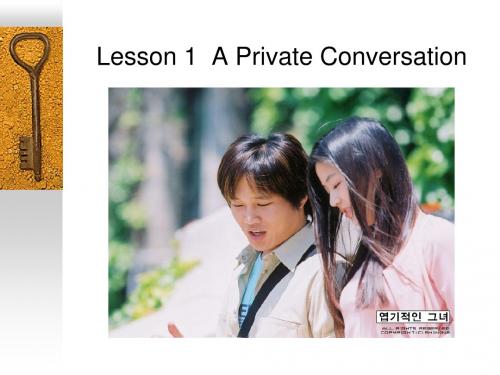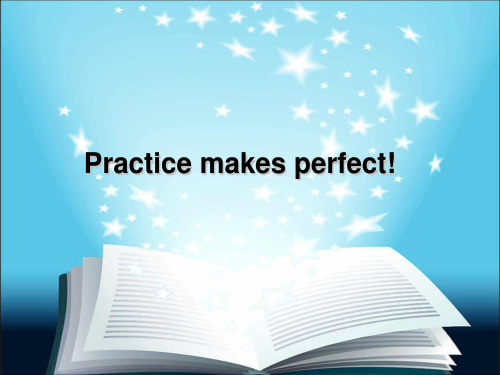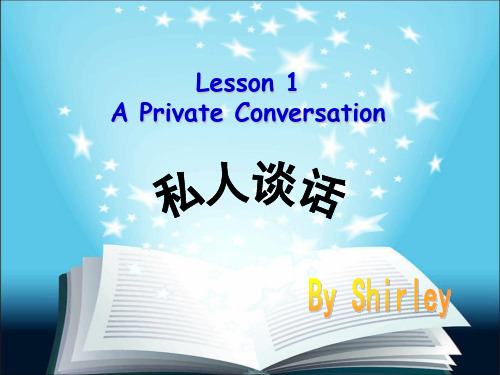新概念英语第二册Lesson 1精编课件PPT教案
新概念英语第二册_lesson_1

attention
[经典用法] pay attention to sb/sth
[比较学习]
notice
不用心去看 attention 用心去盯着 [口语应用] Attention, please! 请大家注意! Attention! 立正! At ease! 放松!
1. Last week I went to the theatre.
[参考翻译] 上个星期,我去了戏院看戏。
[语言点1] 时间状语开门见山,过去的时
间用过去时态顺理成章。故将go改为 went。 [语言点2] 在theatre,cinema,pictures等词 之前一定要加定冠词the。
3. The play was very interesting.
[参考翻译] 那场戏剧演得非常有意
思。 [语言点] very 为副词,interesting为 形容词,副词修饰形容词一般放在 其前面。 比如: very hot非常热, quiet easy 十分简单,但good enough 为例外。
with sb I had a long conversation with my father yesterday afternoon. have a conversation about sth Shall we have a conversation about your vacation ?
例如:
go to the theatre = go to the play去看戏 go to the cinema 去看电影(英式英语) go to the movies 去看电影(美式英语) go to the pictures/films 去看电影 be at the theatre/cinema 在戏院看戏/在
新概念二第一课课件Lesson 1 A private conversation

4. seat n.座位 v.安排坐下,使就坐 have a seat/take a seat 就座 (比sit down更有礼貌) have a good seat 有一个好位置 辨析:seat/sit seat只做及物动词,sit可做及物动词也可做 不及物动词 be seated 坐着,坐下;位于
新概念英语 二
welcome
主讲老师:Arthur
新概念英语二
新概念英语第二册共计96课,分4个单元(每24课一 个单元)前两个单元是对新一语法的操练和重现;第三 个单元较难,是一些复合句,第四个单元为复习单元, 每单元有一个综合考试。 新二是我们学习英语的一个过渡,同时也是一个转变。 从一个会说日常英语的人转变成一个敢动笔进行基本写 作的人。以96篇小故事为素材,培养学生听、说、读、 写的基本能力,其优势在于扩充词汇、统揽语法、集合 实践、听说兼修。在掌握第一册基本语法的基础上,由 浅入深逐步讲解语法要点,使学习者轻松掌握枯燥的语 法;通过对句型结构的分析及对短语用法的讲解,使学 习者在真正的听说读写中运用地道的句型。
问题是你想要做什么
二、主语———动词 在这一句型中,动词为不及 物动词及不及物的动词词组。在有的句子中,不 及物动词可以有状语修饰。 1.The sun is rising. 2.I'll try. 3.Did you sleep well?(well做状语,修饰不及物 动词sleep) 4.The engine broke down. 注意:在此句型中, 有少数不及物动词表达被动含义,表达主语本身 所具有的特性,不用被动语态。 1.The book sells well. 2.The window won't shut. 3.The pen writes smoothly.
新概念英语第二册Lesson1-2课件

【New words and expressions】 生词和短语 ★private adj.私人的 It's my private letter. 1.如果妈妈想看你的信,你可以说: eg: private life 私生活 2.由此引申出private的名词形式:privacy n.隐私 eg:It’s my privacy.这是我的隐私! 3.反义词:public adj. 公共的 私立学校 private school 公立学校 public school
【Key structures】
感叹句往后看 形容词后是名单
关键句型——感叹句
就用what a或what an 形后若是不可数或名复数
只用what就可以
形容词后乱糟糟 只写how就OK了
【New words and expressions】 生词和短语 ★outside adv. 外面 作状语 He is waiting for me outside. It is cold outside. ★ring(rang.rung) v.(铃、电话等)响 (刺耳的) [注]这种响是刺耳的, 往往是提醒人做某事 The telephone(door bell) is ringing. 而风铃等响要用jingle jingle(bell): (铃儿) 响叮当 给某人打电话 : ring sb. Tomorrow I'll ring you. 打电话(名) : give sb. a ring Remember to ring me/remember to give me a ring 戒指(名词) n
NEW CONCEPT ENGLISH
新概念英语第二册Lesson1课件

新概念英语2背诵500遍后的感受.txt
• 据专家说当背诵的熟练程度达到不经思索脱口而出时就产 生了所谓的舌尖效应。背诵一篇新概念2的文章大概需要 15~20遍左右(本人需要20遍)新3的文章 长度和难度都 有所增加,可能需要重复更多的次数。当你能背下来一篇 句脑子总在想着下一句是什么。这样的背诵不能 起到学好英语的目的。有些人能背下新2新3但总觉得收效 甚微,就是因为他没达到脱口而出的地步。有些人反对用 背诵法来学英语因为这没有 什么效果。其实背诵法有没 有效果,要看你是否达到了脱口而出的境地。这时产生了 舌尖效应,汉语思维将不在阻碍英语语感和英语思维。你 会有一种豁然贯通的感 觉。
•
• 为了证实舌尖效应本人亲自做了试验。首先用网上流传的循环背诵大 表制定了背诵新概念2的计划。然后把音频文件拷入到mp3播放器中 反复听,反复模仿跟 读,每篇文章都要模仿的惟妙惟肖,然后背诵。 当背完整本新概念2时,我又在此基础上将每篇文章背诵了将近500遍 左右。终于能在78分钟之内背完所有文 章。每一篇文章都达到了脱 口而出的地步。终于产生了舌尖效应,96篇文章背下来并没经过大脑 思考,完全是嘴巴和舌头在起作用,你会有一种和英语融为一体的 感 觉。连读,吞音,爆破,语调,节奏等这些所谓的发音难点都自然而 然的被攻破了。随便拿一篇英文来读,你会有一种洋腔洋调读英文的 感觉。听写VOA慢速英 语时感到前所未有的轻松,只需听一两遍就 能听懂,生词几乎影响不了我对新闻的理解。此时听写VOA不再是以 听懂新闻为目的了,而是以积累词汇为目的了。因 为你听写过的生词, 查过字典印象非常深刻。我试听了VOA标准英语和CNN,语速都能接 受,并不觉得快,并且能听懂一小部分。虽然只有一小部分但我却有 成 功的喜悦。我尝到了背诵法的成功。我总共用了112天。达到了舌 尖效应,听力,口语有了大幅度上升。而在此之前,我根本听不懂 VOA,口语也只会说几句日 常用语。112天让我有一种脱胎换骨的感 觉。
新概念英语第二册Lesson1课件

I could not hear the actors.
Key structures and usage
过去进行时:过去某个时间正在进行 或发生的动作 A young and a young woman were sitting behind me.
They were talking loudly.
• • • • • • • • • • • • • • •
【Key structures】 简单陈述句的语序 陈述句一定是有主语,有动词,有宾语,有句号 6 1 2 3 4 5 6 when? Who? Action Who? How? Where? When? Which? Which? What? What? 1 ---主语,一般由名词、代词或名词短语构成,通常位于动词之前,动词必 须与主语一致,即主语决定动词的单复数形式 2 ---谓语,由动词充当 3 ---宾语,一般为名词、代词或名词短语 4 ---副词或介词短语,对方式或状态提问,往往做状语 I like her very much 5 ---地点状语,一般在方式副词之后,时间副词之前 6 ---时间状语,可以放在句首或句末 简单陈述句一定不能少的是主语, 谓语. 如果问何时何地,是一个固定搭配 when and where
• • • • • •
★business n. 事, 生意 ① n. 生意 business man :生意人 do business: 做生意 ② n. 某人自己的私人的事情 It's my business. (指私人的事, 自己处理的 事) • It's none of your business. 不关你的事。
Language points
以下短语中名词前不加冠词:
新概念英语第二册 lesson 1

lesson 1 A private conversationLesson 1 A private conversation课文内容:Last week I went to the theatre. I had a very good seat. The play was very interesting. I did not enjoy it. A young man and a young woman were sitting behind me. They were talking loudly. I got very angry. I could not hear the actors. I turned round. I looked at the man and the woman angrily. They did not pay any attention. In the end, I could not bear it. I turned round again. ‘I can't hear a word!’ I said angrily.‘It's none of your business, ’ the young man said rudely. ‘This is a private conversation!’Notes on the text 课文注释1 go to the theatre,去看戏。
2 got angry,生气。
3 turn round,转身,也可用turn around。
4 pay attention,注意。
5 I could not bear it.我无法忍受。
其中的it是指上文中的那对男女大声说话又不理会作者的愤怒目光。
6 none of your business,不关你的事。
参考译文:上星期我去看戏。
我的座位很好,戏很有意思,但我却无法欣赏。
新概念英语第二册Lesson1-L
Simple past tense
It is used to express an action that occurred in the past.
Extended Grammar
Passive voice
It is used to focus on the action rather than the subject.
02 Vocabulary learning
Basic vocabulary
• Lesson objectives: To introduce basic vocabulary related to daily life and common situations.
Basic vocabulary
corresponding English words. Ask learners to match each picture with the correct English word. • Word association: Provide a word and ask learners to generate related words or phrases. For example, if the given word is "restaurant," learners might come up with "menu," "waiter," "fork," etc. • Sentence completion: Provide incomplete sentences and ask learners to fill in the missing words with the correct vocabulary. For example, "I went to the _____ to watch a movie." The missing word would be "cinema."
新概念英语第二册_lesson_1
have a conversation about sth Let’s have a conversation about your
performance this semester.
(并列句) 文中 Last week I went to the
theatre.
时间状语 主语 谓语 地点状语
Ⅲ. Text study
Last week I went to the theatre. I had a very good seat. The play was very interesting. I did not enjoy it. A young man and a young woman were sitting behind me. They were talking loudly. I got very angry. I could not hear the actors. I turned round. I looked at the man and woman angrily. They did not pay any attention. In the end, I could not bear it. I turned round again. ‘ I can’t hear a word!’ I said angrily.
间用过去时态顺理成章。故将go改为 went。 [语言点2] 在theatre,cinema,pictures等词 之前一定要加定冠词the。
例如: go to the theatre = go to see the play去
新概念英语第二册Lesson1-Lesson2课件
Language points
1. private adj. 私人的 private letter/house ;private school:私立学校
private life 私生活
private space 私人空间
public
公共的,公开的
pubic letter 公开信
public place 公共场所
10. In the end, I could not bear it. bear v. 容忍 eg. I can't bear it. 我受不了了。 stand=put up with=bear 都可以表 示容忍 bear n. 熊 a big black bear 一头大黑熊
in the end:最后,终于 finally; at last
简单陈述句:了解其功能;理解其语 序及组成部分。 The policeman arrested the thief . 主语 谓语 宾语
The thief arrested the policeman.
主语 谓语 宾语
主语;谓语;宾语;方式状语;地点状语;时间状语 主语;谓语;表语
6
1主语
Which? What?
Listen and read the text to find out the answers to the following questions
• • • • • •
1 What day was it? 2. When did you get up last Sunday? 3. What was it like outside? 4. Did you think it was a nice day? 5. What happened just then? 6. Who was on the phone?
新概念英语第二册-lesson1课件
12 There are a lot of people at the bus stop. 13 The little boy ate greedily an apple in the
kitchen this morning. 14 She draws beautifully. 15 I like music very much. 16 They built a new school in our village last year. 17 The match ended at four o'clock. 18 She received a letter from her brother last week.
3. The play was very interesting.
[参考翻译] 那场戏剧演得非常有意 思。
[语言点] very 为副词,interesting为 形容词,副词修饰形容词一般放在 其前面。
比如: very hot非常热, quiet easy 十分简单,但good enough 为例外。
have a conversation about sth. 例:Shall we have a conversation
about your vacation ?
同义词:
conversation 无拘束或非正式的 谈话
talk
谈话内容可正式或非正式
chat
闲谈、聊天
discussion (小型的)讨论、商议
like意义要深得多。 enjoy music享受音乐, enjoy dinner享受宴会, enjoy life享受生活
② enjoy doing enjoy swimming 喜欢游泳, enjoy fishing喜爱钓鱼 ③ 一般不可说enjoy sb This morning I enjoyed my English
- 1、下载文档前请自行甄别文档内容的完整性,平台不提供额外的编辑、内容补充、找答案等附加服务。
- 2、"仅部分预览"的文档,不可在线预览部分如存在完整性等问题,可反馈申请退款(可完整预览的文档不适用该条件!)。
- 3、如文档侵犯您的权益,请联系客服反馈,我们会尽快为您处理(人工客服工作时间:9:00-18:30)。
New words and expressions
☆rudely 粗鲁地 rude 粗鲁的 eg.Don't be so rude to your friends polite 礼貌的
angry/angrily rude/rudely loud/loudly quiet/quietly
1. The writer got very _a_n_gr_y. That’s why he looked at them a_n_g_ri_ly.
New words and expressions
☆private adj.私人的 private letter. private life 私生活
privacy n.隐私
private school(私立学校) public school.公立学校 eg.public letter 公开信;public place 公
New words and expressions
☆angry adj.生气的 cross=angry be angry with sb 生某人的气 eg.My mother is angry with me at my
mistake. angrily生气地
New words and expressions
New words and expressions
☆seat n.座位 这个词很重要,考试常考。 在口语、电影里很常见:Is the seat taken? 请坐的3种说法: Sit down,please.(命令性) take your seat,please. Be seated,please.(更礼貌)
New words and expressions
☆theatre n.剧场,戏剧 [记忆]cinema 电影院 put on a play 上演戏剧 ☆loudly 大声地 eg.speak loudly,please eg.We shouldn't speak loudly in public place
Hello, I'm Serena, I am so happy
to be your teacher!
What's your name?
让我们成为好朋友
What’s your name? Do you like English? Why? What’s your hobby?
What do I like doing in my spare time?
4. Listen. It’s very _q_u_ie_t in the reading room. Everybody is reading their books q_u_ie_t_ly. So, please keep _q_u_ie_t .
2. All his classmates do not like him because he is Hruede always speaks to others ____ru.dely
3. The teacher has a _lo_u_d_ voice. He likes to speak l_o_ud_l_y. He always says that he can’t hear us if we don’t talk _lo_u_d_ly_.
actress? 6. Why or why not?
interesting, funny
1 private ['praivit] a.私人的 2 conversation [kɔnvə'seiʃən] n.谈话 3 theatre ['θiətə] n.剧场,戏院 4 seat [si:t] n.座位 5 play [plei] n.戏 6 loudly ['laudli] ad.大声地 7 angry ['æŋgri] a.生气的 8 angrily ['æŋgrili] ad.生气地 9 attention [ə'tenʃən] n.注意 10 bear [beə] v.容忍 11 business ['biznis] n.事 12 rudely ['ru:dli] ad.无礼地,粗鲁地
共场所
New words and expressions
☆conversation n.谈话 几种谈话:
talk 讨论,谈论 conversation 一般用于正式文体中 dialogue 对话,可以指正式国家与国家会谈。 eg.China and Korea are having a dialogue. chat 闲聊,就是北京人说的“侃” gossip 嚼舌头,说长道短 用法:have a +...
☆bear(bore,boren) v.容忍 忍受的几种说法: put up with=bear=stand eg. I can't stand it bear n.熊
New words and expressions
☆business n.事,生意 business man 生意人 do business 做生意 be on business 出差 business:某人自己的私人的事情 thing:可以指事情,也可以指东西 It is none of your business 不关你的事
☆attention n.注意 Attention,please. pay attention to 对……注意 eg. Pay attention to your spelling,please pay a little/muew words and expressions
Have you seen these films?
Lesson 1 Private conversation
1.Do you like seeing the film? 2. Where can you see the film? 3. Tell me about the film you like. 4. Who is your favourite film star? 5. Would you like to be an actor /
